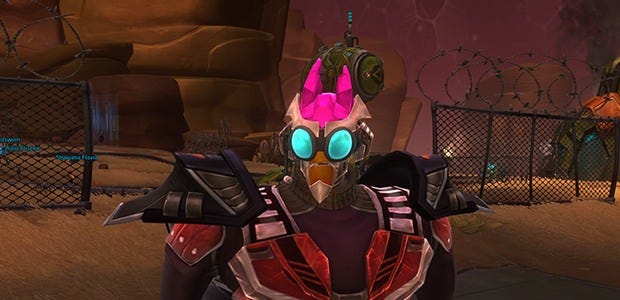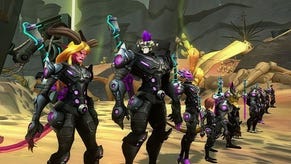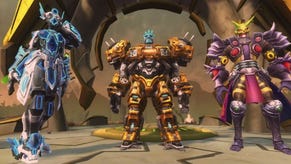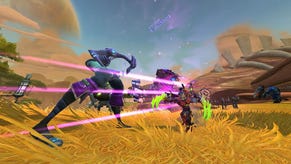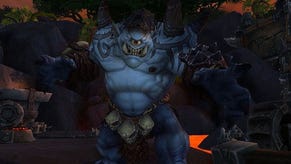Wot I Think: WildStar Reloaded
An unusually generous free-to-play model
Released in June last year, WildStar’s player count didn’t so much dwindle as vanish into the nether. Despite comic book stylings and zany humour, logging on was a lot like touring a nursing home, the party atmosphere muted by the aspect of Death trailing behind and checking his watch. Or if not death, then the spectre of the game's inevitable free-to-play conversion.
For the past few days I’ve been relearning the ropes in WildStar Reloaded [official site], which isn’t a shot in the arm so much as a new bionic hip. Quaint trappings like the subscription fee have been removed, but developers Carbine have gone much further, also overhauling and streamlining the game in umpteen different ways. Here’s wot I think after a hectic opening week.
It’s busy, O thank WildStar’s Eldan space gods, it’s busy. Bodies on the ground are what count if WildStar Reloaded is to stand the slightest chance of survival. I’ve been queuing like a champ to get in, even at off-peak times, and it’s a situation that’s only just been alleviated by the introduction of two temporary overspill servers on either side of the Atlantic. It’s hard to begrudge the usual madness that accompanies an MMO launch (or re-launch) having experienced the crushing emptiness of WildStar’s levelling zones beforehand. Now the ‘nearby players’ pane teems, with noobs hopping into chat in their droves to ask questions of the vets who have come back to see what's changed. It’s a lovely community - you know, as online games go. The old guard are so excited to see new faces that help flows freely and politely; a semblance of the determined, stiff-upper-lip cohesion exhibited by the diehards even when the population was going down the pan.
Queue times for group content like the lengthy dungeons or impromptu adventures are down, not that ‘down’ does the reduction justice when previously it was quicker to organise parties through chat than to let the group finder piece one together. During prime time, expect to wait less than 10 minutes for a dungeon run and not at all for adventures and expeditions (challenges that scale based on the number of players, formerly called shiphands). PvP remains unhinged as ever (you try strategising when 20 people are simultaneously projecting death rays onto the ground) but it seems the newcomers are happy to be cannon fodder, because the level-six battleground, Walatiki Temple, is never more than a few minutes’ thumb-twiddling away. The same can’t be said for the upper end of PvP, but it’s reasonable to expect a delay while the new wave of players wends its way towards the level cap.
Lag is a consequence, of course. Carbine have been releasing patches rapidly, but fighting in those first few zones feels like it’s being relayed via the moon – a real pity, because to make long-term prospects of the free-to-play day-trippers, WildStar needs to be flaunting its dynamic don’t-stand-in-the-murder-zones combat system. Still, the devs have already lain to rest one frustrating capacity issue that caused me to bounce back and forth between character selection and load screen, so there’s hope for their ongoing engineering work yet. What is peculiar is Reloaded’s absence from Steam: a SteamDB entry that appeared in March and gave the game away regarding the existence of free-to-play had suggested it would join the catalogue. If I were in need of meat to fill my ailing sci-fi MMO, Steam is where I’d be, but it could be that this launch is a stress test before leaping on Valve’s platform later this year.
Barring the standard server problems that accompany a week-one surge, WildStar Reloaded is alive and bustling. But how does it treat its players now they’re not bound to it by a subscription? Borderline philanthropically. It appears NCSoft have drawn from the Guild Wars 2 school of thought, applying light-touch monetisation that does not, in any way that I’ve been able to divine, impact your experience of the game. In some cases, things have improved. The housing plots, one of WildStar’s defining features and literal bastions of player expression, have more than tripled in size, the better to stuff with tasteless follies collected while adventuring. Intriguingly, WildStar’s cash shop, nestled in the lower-left corner of your screen, isn’t stuffed to the gills with décor either. There’s a selection of exclusive goods, sure, but it’s closer to a half-hearted car boot sale than some sort of off-brand IKEA. Instead, Carbine are flogging multiple tiers of capacity upgrades to boost the amount of tat you can show off at once, up to 4,000 separate objects. It’s smart: everyone has access to the same range of dayglow house fittings; everyone gets extra space; but only those properly hooked on the housing will end up paying. Similar exists for the holo-wardrobe, whereby you pay for additional armour and weapon skin storage.
400 NCoins costs you £4; 390 will get you room for 100 new skins and 210 will buy an extra character slot (new users start with two, up to a maximum of 14). Not extortionate in my opinion, but I’ve never been one for alts and having bought the game at launch I qualify for extra characters anyway, so perhaps I’m not the best judge of whether £4 for extra bank space is a rip-off. It doesn’t really matter though – everything in the cash store can be yours for omnibits, a secondary currency earned just by being out there doing stuff. So far I’ve acquired omnibits for finishing quest chains, as part of regular loot drops, and for liquidising a guy in PvP. That last one felt good. Omnibits keep you out in the world doing stuff, which will hopefully keep zones thriving in the long term but stop short of becoming a grind. I’ve scooped them up at a rate of about one every two minutes, so saving for a 115-omnibit bank expansion isn’t all that daunting when they’re handed out for playing as normal.
In fact, each time I spied something insidious and prepared to type with righteous fury against the impositions of free-to-play, minutes later I would unearth a reasonable alternative. Service tokens got my shackles up briefly, their primary uses being to reduce cooldowns on teleports (which remain at their pre-free-to-play values) and unlock extra rune slots on gear. Rune slots are a big deal, allowing you to socket stat-boosting runes and thus increase your chances of remaining intact in WildStar’s sadistic raids. This, surely, was putting power behind a paywall. But no, if you don’t want to spend your hard-earned omnibits on the basics, every 10 days you’ll be awarded a sack of service tokens for consistent logging in.
I can’t help but think of the current state of the premium economy as a sort of quantitative easing – that NCSoft are keeping prices down to get the players in before rebalancing once the accountants know what they’re working with. WildStar Reloaded is generous to an absurd degree, built to the budget of a premium MMO but now available to all. I don’t personally foresee any need to pay out.
I am admittedly flush with the benefits of longstanding membership, but that in itself is evidence of the care that’s gone into cooking up this brand of free-to-play. One of the major limitations on free players is the inability to create or invite others to a guild, or to maintain more than one ‘circle’ of specific friends. For the socialites who have subscribed from the start, the loss of those basic functions would be bitter, but the Cosmic Rewards programme intervenes. As you spend money on WildStar, you earn loyalty points in the store, unlocking account bonuses that are otherwise reserved for Signature members (£9-per-month access to experience boosters, guild ownership, etc.). For former subscribers, Cosmic Rewards are applied retroactively, retaining the social features they used to enjoy and chucking some vanity pets and mounts their way for good measure.
Carbine have put similar care into touching up the year-old world ahead of the new arrivals. Crafting has benefited no end from an overhaul, and where before it involved calculating vast quantities of raw materials to buy from the nearby vendor, recipes, like omnibits, now ask you to venture out and gather the bulk of ingredients on your travels. It is peculiar that crafting now incurs an in-game fee, and rumblings on the forums suggest that levelling a tradeskill might have become prohibitively expensive relative to farming loot, but at the same time WildStar’s new money sinks, including the enormously inflated armour dyeing cost, look to have reduced individual buying power and might have helped stabilise commodity prices. Prior to the update, raw materials auctioned for less than their vendor price, so the long-term health of the wonky economy will be a key test of the new model.
These changes to material gathering, combined with characters who now sprint by default and the ability to warp anywhere from an icon on your minimap, emphasise that WildStar wants you out there doing, questing, and exploding rather than mooching in the capital cities. The world is a pleasure as ever, and an upgraded lighting system that dials back on the neon bloom means that the Saturday morning cartoon style hasn’t aged a day.
Despite what must have been a torrid year for Carbine and WildStar, the energy and flamboyance with which it launched has been stepped up for Reloaded. It’s testament to their good humour that the patch notes for the biggest update in WildStar history open, “Fixed a journal inaccuracy and made it clear Nexus orbits a trinary star system.” As classic MMOs go, WildStar was exceptional – light and fun while retaining some bite in its endgame raids. It came years too late, however, when its target audience of disenfranchised Warcraft players had neither the time nor the inclination to tie themselves down with a subscription fee. Reloaded is a better game still, incorporating a year’s lessons in managing a live MMO and, at this stage at least, its free-to-play model is surprisingly unobtrusive.
WildStar Reloaded is out now.
